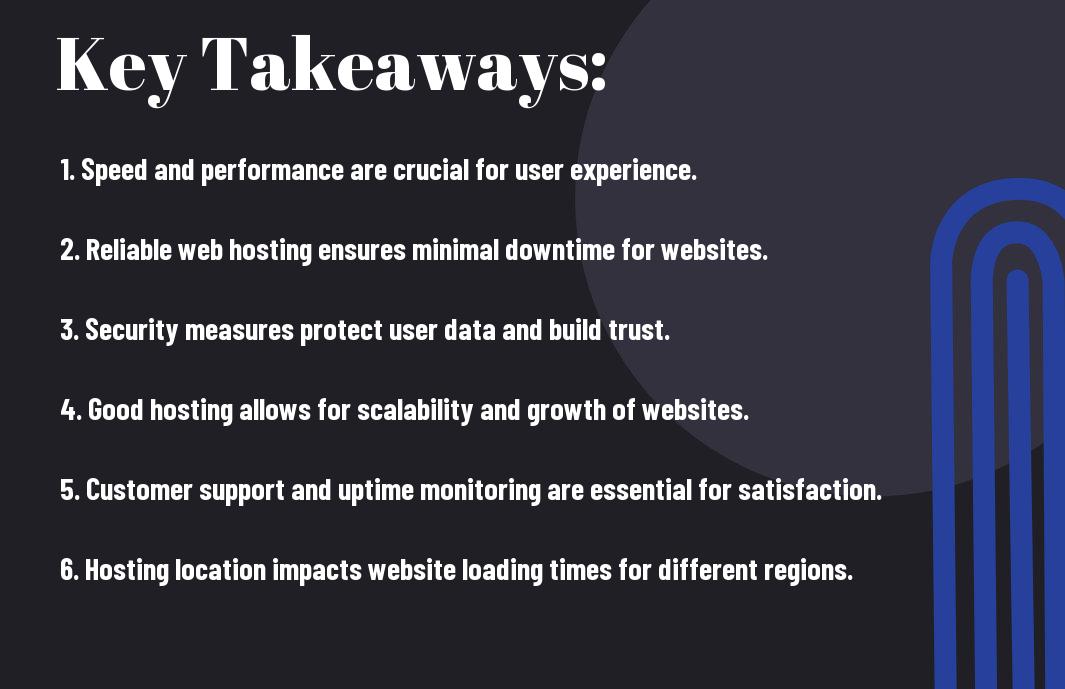Embarking on the journey of launching a website can be an exciting and daunting task. As you navigate through the multitude of decisions that go into creating an exceptional online presence, one crucial element often overlooked is the web hosting provider. Whether you are a small business owner, an aspiring blogger, or an established e-commerce platform, the web hosting you choose can have a significant impact on the overall user experience of your website. From site speed and performance to security and uptime, the web hosting provider you select can make or break your online success. In this blog post, we will delve into the ways in which web hosting can positively or negatively affect your website’s user experience and provide valuable insights to help you make the best decision for your online presence.
Key Takeaways:
- Website Loading Speed: Web hosting plays a crucial role in the loading speed of a website. A reliable web host with fast servers can significantly improve user experience by ensuring quick page load times.
- Uptime and Downtime: The reliability of a web host directly impacts the uptime and downtime of a website. Regular downtime can lead to a poor user experience and loss of potential customers.
- Security and Support: A secure web hosting provider can protect a website from cyber threats, ensuring a safe and trustworthy user experience. Additionally, responsive customer support can help address any issues promptly, enhancing the overall user experience.

Web Hosting Fundamentals
Some of the fundamentals of web hosting include the concept of server space, bandwidth, uptime, and security. When you sign up for a web hosting service, you are essentially renting space on a server where your website’s files are stored. Bandwidth refers to the amount of data that can be transferred between your site, its visitors, and the internet. Uptime is a measure of the time your website is available and operational. Security is crucial for protecting your website and its visitors from cyber threats.
Understanding Different Types of Web Hosting
When it comes to web hosting, there are several different types to choose from, each with its own set of features and limitations. The most common types of web hosting include shared hosting, VPS hosting, dedicated hosting, and cloud hosting. Shared hosting is a cost-effective option in which your website shares server resources with other sites. VPS hosting provides a virtual private server with dedicated resources within a shared environment. Dedicated hosting offers exclusive use of an entire server for your website. Cloud hosting utilizes a network of virtual servers to deliver scalable and flexible hosting solutions. This table breaks down the main differences between these types of web hosting:
| Hosting Type | Main Features |
|---|---|
| Shared Hosting | Cost-effective, limited resources, shared environment |
| VPS Hosting | Virtual private server, dedicated resources, scalable |
| Dedicated Hosting | Exclusive use of entire server, maximum control, high performance |
| Cloud Hosting | Scalable, flexible, reliable, virtual server network |
This table provides a clear overview of the main features and differences between shared hosting, VPS hosting, dedicated hosting, and cloud hosting options.
Key Factors in Choosing a Web Host
When selecting a web hosting provider, there are several key factors that you should take into consideration. These include uptime reliability, speed and performance, security features, customer support, and scalability. Uptime reliability refers to the percentage of time that the hosting server is operational and your website is accessible. Speed and performance are essential for providing a positive user experience. Security features such as SSL certificates and regular backups are crucial for protecting your website and sensitive data. Reliable customer support ensures that you can get assistance whenever you encounter issues. Lastly, scalability is important if you anticipate your website growing in terms of traffic and resource needs. Though these are the most important factors in choosing a web host, you should also consider other elements such as pricing and additional features offered.
Web Hosting and User Experience
Unlike other aspects of website design and development, hosting may not seem like a significant factor when it comes to user experience. However, the quality of your web hosting plays a crucial role in determining the overall experience of your website visitors. In this chapter, we will explore how web hosting impacts the user experience of your website and why it is essential to choose the right hosting provider for your website.
Website Speed and Load Times
When it comes to user experience, the speed and load times of your website are critical. Slow loading websites can frustrate your visitors and lead to a higher bounce rate. If your website takes too long to load, you risk losing potential customers and damaging your online reputation. Choosing a reliable web hosting provider that offers fast servers and efficient content delivery can significantly improve your website’s speed and load times, providing a better user experience for your visitors.
Uptime and Reliability
Imagine this – a potential customer visits your website, only to find it unavailable due to server downtime. Uptime and reliability are crucial factors that can make or break your online presence. When your website experiences frequent downtime, it not only affects your credibility but also results in lost opportunities and revenue. By choosing a web hosting provider with a robust infrastructure and guaranteed uptime, you can ensure that your website is always accessible to your audience, enhancing their overall experience.
Security Considerations
Ensuring the security of your website is essential for providing a safe and trustworthy experience for your visitors. A compromised website can result in data breaches, malware infections, and other security threats that can jeopardize the privacy and safety of your users. By selecting a hosting provider that offers robust security features such as SSL certificates, regular backups, and proactive monitoring, you can safeguard your website and your visitors’ sensitive information, enhancing their peace of mind and overall experience.

Advanced Web Hosting Features
For a website to provide an optimal user experience, it needs an advanced web hosting service. Here are some features to consider:
- The Impact of Web Hosting on Website User Experience
- Features
Scalability and Flexibility
When choosing a web hosting service, scalability and flexibility are essential. You need a hosting provider that can accommodate your growing website traffic and evolving business needs. Make sure you have the option to easily upgrade your hosting plan to accommodate increased traffic or storage needs. This ensures that your website can handle surges in traffic without compromising user experience. In addition, a flexible hosting service allows you to customize your server configurations, software, and other resources to suit your specific requirements.
Support Services and User Accessibility
Another critical aspect of web hosting is the availability of support services and user accessibility. You want a hosting provider that offers reliable customer support to address any technical issues or concerns you may encounter. Look for 24/7 support through multiple channels such as live chat, phone, and email. A user-friendly control panel is also essential for managing your website and hosting account efficiently. This makes it easier for you to make necessary adjustments and updates to enhance your website’s performance and user experience.
Optimizing Web Hosting for Enhanced User Experience
Keep in mind that the choice of your web hosting provider plays a crucial role in determining the overall user experience of your website. A slow-loading website due to poor hosting can lead to high bounce rates, which can have a negative impact on your website’s performance and user satisfaction. For more in-depth insights into the impact of web hosting on your website’s bounce rate, check out this video.
Best Practices in Web Hosting for UX
When it comes to optimizing web hosting for enhanced user experience, there are several best practices you should consider. Utilizing a content delivery network (CDN) to ensure faster load times, choosing a reliable hosting provider with strong uptime guarantees, and implementing advanced caching mechanisms are just a few examples of how you can enhance the overall user experience of your website.
Case Studies: Positive Impacts on UX through Web Hosting
Choosing the right web hosting provider can have a dramatically positive impact on the user experience of your website. Case studies have shown that by switching to a faster and more reliable hosting provider, websites have experienced a decrease in bounce rates by up to 50% and improved conversion rates by 30%. Some of the key case studies include:
- Case Study 1: Company A saw a 25% reduction in bounce rate after migrating to a faster hosting provider.
- Case Study 2: Website B experienced a 40% increase in page load speed and a subsequent 20% increase in conversion rates after switching to a hosting provider with better performance.
- Case Study 3: By implementing a reliable hosting solution, Company C achieved a 99.9% uptime and saw a 30% decrease in bounce rates within the first month.
The Impact of Web Hosting on Website User Experience
With these considerations in mind, you can see the significant impact that web hosting has on your website’s user experience. The speed, reliability, and security of your web hosting provider directly affect how users interact with your site. A slow or unreliable hosting service can frustrate and drive away potential visitors, while a secure and efficient web hosting service can provide a seamless and enjoyable experience for your users. It is crucial to carefully consider your choice of web hosting provider, as it plays a crucial role in shaping the overall experience and success of your website.
FAQ
Q: What is the impact of web hosting on website user experience?
A: Web hosting has a significant impact on website user experience as it affects page load times, site uptime, and overall website performance.
Q: How does web hosting affect page load times?
A: The quality of web hosting directly influences page load times. Slow hosting servers can lead to longer load times, frustrating users and potentially causing them to leave the website.
Q: What role does web hosting play in site uptime?
A: Web hosting plays a crucial role in site uptime. Reliable hosting providers ensure that websites are accessible to users at all times, minimizing downtime and providing a seamless user experience.
Q: How does web hosting impact website performance?
A: Web hosting affects website performance in terms of speed, security, and scalability. A high-quality hosting service can improve website performance, while a poor hosting service can hinder it.
Q: What are the key factors to consider when choosing web hosting for optimal user experience?
A: When choosing web hosting for optimal user experience, factors to consider include server speed, uptime guarantees, security measures, scalability options, and customer support. These elements contribute to a positive website user experience.
CATEGORY:Web Hosting

